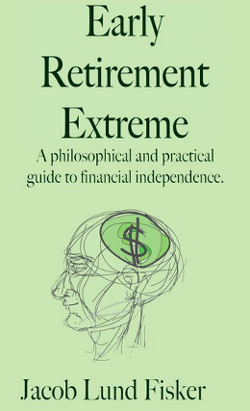
Early Retirement Extreme is a blog by Jacob Lund Fisker, a man who decided to radically reduce his expenses so that he could retire — even on his ordinary salary and without any freakish windfalls — in his early thirties.
He’s spending about ⅓–½ of what I do, and living in roughly the same area, so I might be able to learn some frugality tips from him. At first glance, his rent is much lower (he lives in an RV), his health insurance is much lower (I’m going to look into a better plan, though I already do the HDHP/HSA thing, so this might just be because of my more-expensive age cohort), and he pays about ¼ what I do for food (I’m sure I could do better here, but this is also an area where I very deliberately indulge).
Much of his story sounds very familiar to me, though Jacob got into this lifestyle through a finely-tuned sense of rational self-interest, rather than backing in to it accidentally via conscientious objection to taxpaying like I did. Here’s some of his thinking on the subject:
There are essentially two premises to ERE.
The first premise is that financial independence is much more easily obtained by finding ways to reduce monetary expenditure than by finding ways to increase monetary income. For 80% of all people it is much easier to reduce their expenses by a factor 10 compared to increasing their income by a factor 10. Only the poorest and the richest can easily increase their income.
The second premise is one can easily live a happy life on much less than is commonly assumed. In fact the difference is sometimes extreme. In a consumer society, the standard measure of utility is money. If it’s twice as expensive, it must be twice as good, right? Wrong! This misconception originates from consumerism where on the poor end of the scale you eat $3 mashed potato powder bought at a quickie-mart, and at the high end of the scale you buy one small scoop of superbly crafted mashed potatoes on a large plate for $25 at a classy restaurant. However, if you make your own mashed potatoes, you can buy a 10lbs sack of potatoes for $1 at the farmer’s market during potato season — or grow them yourself — and make a meal that is only limited by your own skill level; after a few months of practice that is probably at least 80% as good as the chef and easily much better than the pre-processed powder. And, yes, out of potato season, you either clamp them or don’t eat potatoes and eat something else that’s in season and therefore inexpensive.
What follows from these premises is that for those who are willing and able, it is often possible to reduce expenses significantly by doing things differently, more in tune with the natural flows of resources so to speak, rather than doing more or less of the normal way and expecting instant gratification without considering the short- and long-term costs.
If you put these together: Spend less, save more, then you can reach the point where your investment income covers your expenses much much faster than what is commonly assumed.
Following those ideas it is possible to retire in 3–8 years on a normal income, hence this is why this blog is named early retirement extreme.

